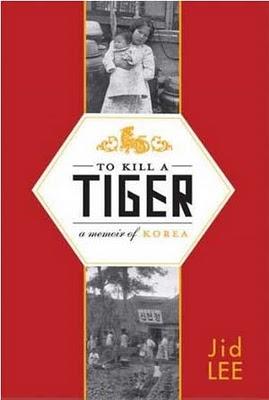To Kill a Tiger: A Memoir of Korea

Spanning five generations, this memoir explores the author’s upbringing and the sociopolitical climate of Korea during the last century through the anecdotes and interpretations of her family. The tales come mainly from her father as told to her mother. (Fathers, we learn, would only discuss such matters with their sons and sometimes their wives, but never with their "unworthy" daughters).
Historical lessons such as these are strewn throughout the text, interspersed with details from Lee’s day-to-day life as a child and teenager and anecdotes told to her by her family members (although most are the author’s own). These are all enhanced by the inclusion of black and white photographs of her family and community placed in nearly every chapter.
Lee presents us with analyses and divergent points of view regarding the Korean War, the Japanese-American-Korean triangle, and what’s gone on in South and North Korea for the last century. Lee also presents us with a brief history of the Korean Feminist movement, which was a joy to read about.
To Kill a Tiger is heavy on Confucian family structure and dynamics. We learn that Lee always came last after her brothers: her Big Brother and Less Big Brother, along with her Father, always got the best foods and the biggest portions, whereas Big Sister, the author, Little Sister, Mother, and Grandmother got the least nourishing foods and the smallest portions—especially Mother and Grandmother. Lee's upbringing is a stifling way of life, so oppressive and palpably rendered by the author that it floated off the page and painted my experience of the memoir, sometimes making me shake with disdain. This is particularly true in the passages told from the viewpoint of the author, a vehemently feminist child who argued and fought for her equality in repeated bursts of frustration and anger, way before she ever knew what feminism was or that anyone might agree with her.
Despite many entertaining sections, the book becomes very tiresome to read after one realizes that the drawn-out conversations between Lee and her family members (her mother in particular) do not appear in just a chapter or two, but consistently throughout. We continually receive a one-sided view of decades of Korean history and politics, often unofficial because the facts have ostensibly been covered up by the government. These portions discuss Korea’s strained relationships with Japan and the United States, the torture of political prisoners and women systematically raped in wars, and other tremendously delicate matters. Not only are these dialogues interminable, but they are also unreliable.
We also read redundant arguments between the author and her misogynist father regarding her worth as a female. I understand that Lee wants to make clear the derisive and poisonous attitude of her male family members towards her and women in general, but it quickly becomes like a broken record.
I had to skip entire pages in order to get through this memoir, which I lament because the premise of this book is promising and intriguing. Alas, it sorely disappoints.
What I applaud is this: It is a story of a tough, feminist kid who goes through hell and emerges victorious against everyone’s expectations. Lee triumphantly gives patriarchy the finger and fulfills her dreams, giving women everywhere—and especially those languishing in a sexist society more oppressive than that of Western culture—hope for everything they wish to accomplish.